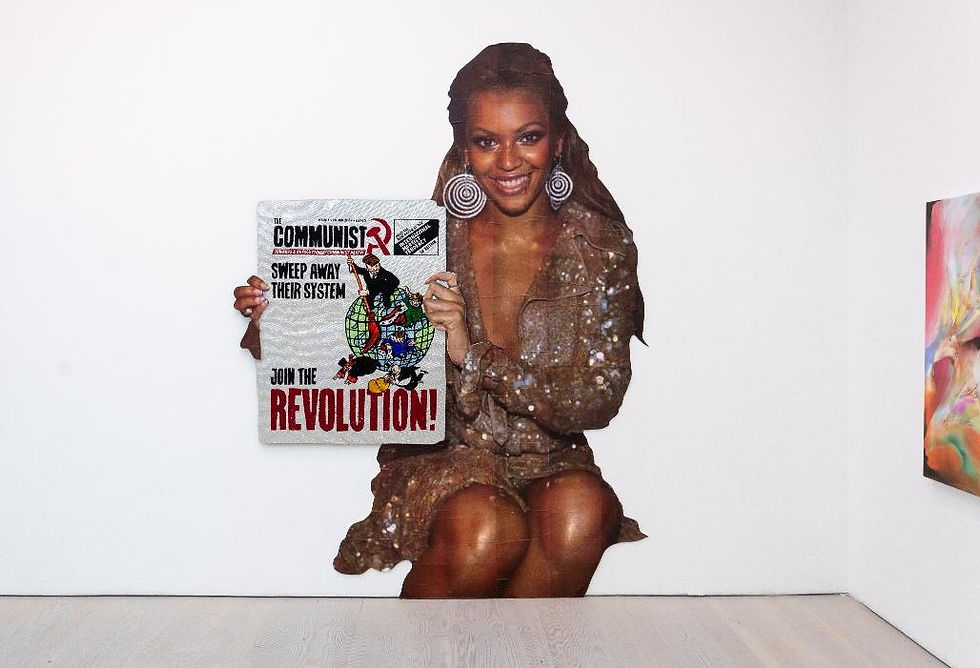"NOTHING HAPPENS IN ISOLATION": EMMANUEL VAUGHAN-LEE ON EMERGENCE'S 'SHIFTING LANDSCAPES' EXHIBITION
- Nastia Svarevska
- Dec 6, 2023
- 5 min read

“Take care of yourself out there,” a thoroughly wrapped-up barista whispers as he hands me an immediately cooled-off oat cappuccino on a Friday morning. You can tell winter has arrived, and since his festively decorated coffee stand is pretty much outside, overlooking the River Thames, I wish him good luck and dash away, carried by the swift current of my thoughts. My senses are already on edge, yet I feel them becoming more alert as I step into Bargehouse, an old industrial building just around the corner. My hurried pace slowly dissipates.
“We wanted to create a space that brings you out of the frenzied environment that we find ourselves in,” says Emmanuel Vaughan-Lee, a founder of Emergence magazine and curator of Shifting Landscapes (1st — 10th of December 2023), an immersive exhibition supporting the release of its fourth issue of the same title. Founded in 2018, the magazine explores the connections between ecology, culture and spirituality. The exhibition stands as a testament to this exploration, presenting works by nine artists who delve into human relationships with the more-than-human world; they highlight the innate interspecies interconnectedness that, at this particular moment in time, is critical to acknowledge and restore as we — hopefully — start moving away from human centrism and exceptionalism.

Image credit: Emergence Magazine
The principal characteristic of this moment is in the magazine’s title: emergence as representing both something coming into existence and a play on the word emergency — a potentially dangerous situation requiring urgent action.
Discussing the inspiration behind it, Vaughan-Lee explains that “it was always to recognise that when there’s so much falling apart and so much crisis, there’s also a space opening,” referring to the liminal space when so much becomes unknown and untenable to comprehend. “The changes are so great… [and] there’s the opportunity to go deeper, individually and collectively. That has always been the impetus behind the magazine, with the stories playing a significant role in tapping into that ancient part of ourselves. [Because] a magazine is a collection of stories, a collection of voices, a collection of ideas.”
The art of storytelling is powerful, and Emergence – which is pushing the boundaries of what a traditional magazine is – brings out its full potential, engaging its audience through live retreats, writing exercises or practices. “The goal of the magazine is to get you to think differently,” which is a stepping stone in making a change, “but also to get you to engage with the world differently,” Vaughan-Lee reveals as we sit down on corduroy bean bags. “The practices offer different ways to do that, and the physical spaces we curate are an extension of that because I don't think anything happens in isolation.”
Shifting Landscapes presents these stories in different formats and mediums, manifesting the slow consumption ethos of Emergence that I immediately pick up on as I walk through the building. It asks me to pause, and I abide. Vaughan-Lee interprets it as “a slower pace of storytelling that allows you to settle in, to get you to disconnect from all the busyness of what’s happening in your mind or around.” He’s not rushing his answers, letting me take them in, yet he knows exactly what they are. “Slowing down is something we need to do. If we’re moving at such a fast pace, we’re not noticing the world around us, and [nature] is here all around us in London, everywhere, but we’re always moving. When the mind slows down, we can acknowledge the importance of being present.”
Gheorghe Popa, Poisoned Beauty
Kiliii Yuyan, Beyond the Horizon
Mona Simon, Lost World
Listening, here, is crucial. Silence is on the verge of extinction; these words of an acoustic ecologist, Gordon Hempton, from the most therapeutic and meditative VR experience Sanctuaries of Silence, keep playing in my mind as the noise of construction invades my conversation with Vaughan-Lee. Both of us are aware of its increasingly intrusive character, which lies in stark contrast to the songs of nightingales I was tuning into just a few moments earlier while sitting on fresh grass in the dark with an intensified sense of hearing – which is also true of other artworks in the show – finding nature in the most unexpected of places in The Nightingale's Song.

“That’s the dangerous thing when we start getting used to the fact that humanoids are everywhere,” Vaughan-Lee sighs, pointing to the wall just next to us that conceals the construction site. “Everything we experience in nature and the living world is through a dominant human veneer. If we become aware of that, it shifts our ability to want to be more present, to seek out a quiet place where we value what we hear, like that birdsong breaking through the construction site. I think a lot of what we’re trying to do is to break that tough covering that prevents us from being aware of this. Once it’s broken, we naturally want to seek that out because it’s nourishing.”
However, it’s not just about feeling nourished and comfortable, as Vaughan-Lee carefully corrects me when I ask about the main takeaway of Shifting Landscapes. With love comes pain; if we cherish the songs of nightingales, we grieve for their vanishing. The exhibition holds the space for both; there’s such a strong sense of mutual love and care, but equally grief and anger. “Once you start to really connect and love and have reverence for a nightingale, you’re also holding the fact that they may no longer sing, and it’s uncomfortable,” Vaughan-Lee tells me with a note of utmost understanding and empathy in his voice, but also a call to action. “If we expect to be able to make the shift while we’re comfortable, then we’re in complete denial… We have to go back to the basics. And to me, the basics are this connection and kinship [with the living world] that we share. If you have that connection, there will be love and care present which you can build from, but it’s going to take time, and we’re going to be uncomfortable.”
As I walk out of the building, allowing my eyes to adjust to the light, I feel much more present in my body. All of my senses have just been engaged, either all at once or one at a time. Without hurrying, I make my way back to the station, consciously trying to take in the surroundings: the Thames, the railway bridge, the coffee stand. Taking care of myself out there suddenly gains a new meaning.
Shifting Landscapes runs from December 1st to December 10th at Bargehouse, Oxo Tower Wharf.
Nastia Svarevska is a London-based curator, editor and writer from Latvia. She holds an MA in Curating Art and Public Programmes from Whitechapel Gallery and London South Bank University and writes for an artist-run magazine, Doris Press. Her poetry has been featured in Ink Sweat & Tears, the Crank and MONO Fiction. You can find her on Instagram @ana11sva and her website anasva.com.









